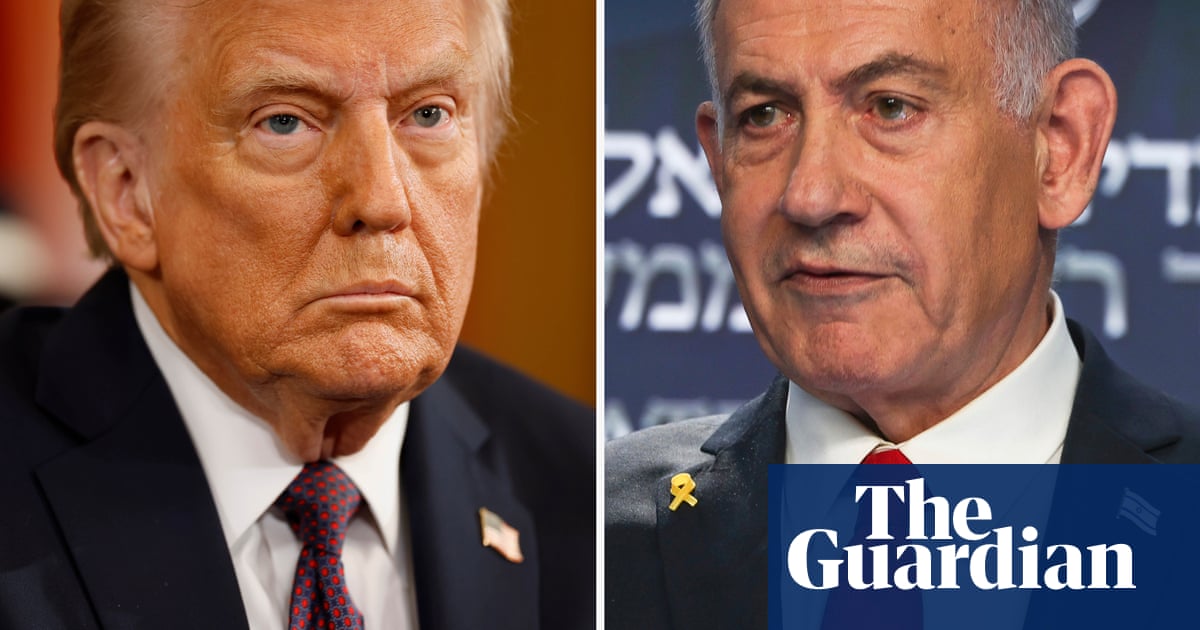Despite a substantial internet blackout, news spread quickly in Iran on Tuesday night: the US wasconsidering joining Israelin its war on Iran.The US president, Donald Trump, wrote on Truth Social: “We know exactly where the so-called ‘Supreme Leader’ is hiding. We are not going to take him out (kill!), at least not for now … Our patience is wearing thin.” Three minutes later, in a second post, he added: “UNCONDITIONAL SURRENDER!”
When Mehnaz*, a 24-year-old student activist in east Tehran, heard the news, she did not think of Iran’s supreme leader, Ayatollah Khamenei. Instead, she thought of her fellow students who were detained, shot and executed by Iranian security forces during the “woman, life, liberty” protests in 2022.
“AfterMahsa [Amini]’s death, we tried to stand up. Teenagers were shot point blank, our compatriots were hanged. We could never get rid of the Islamic Republic on our own. Now, someone from outside is helping us,” Mehnaz told the Guardian via text on Wednesday after a sleepless night of Israeli bombing.
The prospect of imminent US involvement in an Israeli bombing campaign, which is suggested to be in pursuit of regime change, has laid bare deep divides in Iran’s population, even among the opposition. Many are deeply suspicious of the US’s intentions in Iran, which has a bitter history of foreign adventurism gone awry. Others do not care who is the one to topple the government.
A large portion of Iran’s population is bitterly opposed to the government, which has only grown more repressive as the country slips deeper into economic crisis. Just two weeks ago, much of the country was paralysed by a nationwide strike in protest at the dismal economic situation.
To some of the opposition, anything that could topple the Iranian government is welcome, whether it comes from street protests or US bunker busters.
Mehnaz said: “Yes, we’ll probably have massive destruction in Tehran and other cities, but this regime will fall – and then we can rebuild everything again.”
The toll of fighting – now in its sixth day – is growing. Israeli strikes have killed at least 585 people and wounded 1,326 others in Iran, according to Iranian media. At least 24 people have been killed and 600 injured by Iranian strikes in Israel.
Fighting started after Israel launched hundreds of pre-dawn strikes on Iran last Friday, which it said were aimed at preventing the country from obtaining a nuclear weapon. Iran quickly retaliated by firing a barrage of missiles and drones at Israel, kicking off a steadily escalating tit-for-tat war.
To Alborz*, an athlete from Tehran, the cost of Israeli bombing was already too high.“I can’t explain how we pass each day, in fear. It feels like I am walking on a street of hot coal and having acid rain down on me,” Alborz said via text. “We want to get our freedom on our own terms, not through US bombs,” he added.
Iran has a long history of foreign intervention that has left the population suspicious of offers of help.
A 1953 coup that deposed the democratically elected prime minister, Mohammad Mosaddegh, was backed by the CIA and MI6 to protect western oil interests. The intelligence plot features heavily in the national narrative of the current government, which overthrew the western-backed Shah of Iran in the country’s 1979 revolution.
The more recent 21st-century history of US adventurism in the Middle East has inspired further scepticism among Iranians.“Look at Libya, Afghanistan, Iraq – they destroyed the countries, then walked away. It’s funny how they call this ‘exporting democracy’ while they always have paralysed all the democratic institutions in those countries,” Abbas*, a 26-year-old artist from west Tehran, said.
The Israeli prime minister,Benjamin Netanyahu, has called for Iran’s opposition to rise up, suggesting in an interview on Monday that his military operation could help liberate Iranians from an oppressive regime.
Netanyahu told the London-based opposition news outlet Iran International: “A light has been lit, carry it to freedom. This is the time, your hour of freedom is near, it’s happening now.”
His calls rang hollow in Iran, which has seen nightly news broadcasts of starvation, displacement and mass killings in Gaza over the last 36 months.
Abbas said: “Now Trump wants to unite with Israel – and people here are scared. If they come here like they did in other places, we will be left with nothing but ruins and extremist groups.”
While Israeli bombings have battered Iran, its security services have intensified their crackdown on dissidents and political organisation.
“Activists and former political prisoners have been rearrested. They’re basically targeting anyone who’s talking about the war,” said Bahar Ghandehari, the director of advocacy and communications at the US-based Center for Human Rights in Iran.Iranian authorities have restricted internet access, detained activists, and on Saturday arrested 16 people on charges of “spreading rumours” on social media.
The renewed wave of oppression has hardened the desire for regime change for some of the opposition, who now find themselves having to deal not only with Israeli bombings but also fear of arrest.
“Yes, 585 people were killed in this war till now, but in four days of demonstration after Mahsa Amini’s killing, almost 1,000 people were killed by the regime,” said Mohammad Reza, a resident of Tehran in his 50s who took part in the 2022 protests.
- Names have been changed
